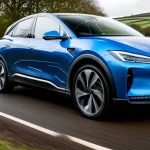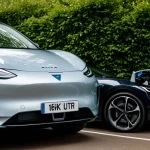Why Are Electric Vehicles Gaining Popularity in the UK Automotive Sector?
The UK automotive sector is undergoing a significant transformation, and at the heart of this change is the rising popularity of electric vehicles (EVs). In this article, we will delve into the reasons behind this trend, exploring the factors driving the growth of EVs, the impact on the market, and what this means for consumers and the environment.
Government Policies and Incentives
One of the primary drivers of the EV boom in the UK is the robust set of government policies and incentives designed to encourage the adoption of electric cars. The UK government has set ambitious targets to reduce carbon emissions, with a goal to ban the sale of new petrol and diesel cars by 2030 and hybrid cars by 2035.
Also to read : What Challenges Does the UK Automotive Industry Face in Transitioning to Electric Vehicles?
Tax Incentives
- Zero Emission Vehicles: EVs are exempt from the annual Vehicle Excise Duty (VED) and the London Congestion Charge, making them a more cost-effective option for many drivers.
- Company Car Tax: The tax rate for EVs used as company cars is significantly lower compared to their petrol or diesel counterparts, making them an attractive choice for businesses.
- Plug-in Car Grant: Although the grant has been phased out for new cars, it previously provided a substantial discount for buyers, helping to boost initial sales.
Infrastructure Development
The UK government has also invested heavily in expanding the charging infrastructure. As of 2023, there are over 30,000 public charging points across the country, with plans to increase this number significantly in the coming years. This rapid expansion of charging infrastructure has alleviated one of the main concerns for potential EV buyers: range anxiety.
Environmental Concerns and Public Awareness
The growing awareness of environmental issues, particularly climate change, has led to a shift in consumer preferences towards more sustainable options. Electric vehicles offer a cleaner alternative to traditional internal combustion engine (ICE) cars, producing zero tailpipe emissions and significantly reducing greenhouse gas emissions over their lifecycle.
Also to discover : How are UK car manufacturers adapting to the shift towards autonomous vehicles?
Public Perception
- Sustainability: Many consumers are now more conscious of the environmental impact of their purchasing decisions. EVs are seen as a way to contribute to a cleaner environment.
- Health Benefits: By reducing air pollution in urban areas, EVs also offer health benefits, which is a compelling reason for many buyers.
Corporate Social Responsibility
Companies are also embracing EVs as part of their corporate social responsibility initiatives. For example, many firms are transitioning their fleets to electric vehicles to reduce their carbon footprint and enhance their brand image.
Technological Advancements and Market Offerings
The electric vehicle market has seen significant technological advancements in recent years, making EVs more appealing to a wider range of consumers.
Battery Technology
- Improved Range: Advances in battery technology have increased the range of EVs, with many models now offering over 300 miles on a single charge.
- Faster Charging: Rapid charging technology allows drivers to charge their vehicles to 80% in under 30 minutes, making long-distance travel more practical.
Diverse Model Options
The market now offers a diverse range of electric vehicle models, catering to different segments and preferences. From compact city cars like the Nissan Leaf to luxury models like the Tesla Model S and the Audi e-tron, there is an EV to suit almost every need.
Market Trends and Sales Data
The impact of these factors is evident in the sales data. Electric vehicle sales in the UK have been on a steady rise, with EVs now accounting for a significant share of new car registrations.
Sales Figures
- 2023 Data: In 2023, EVs made up around 15% of all new car registrations in the UK, a significant increase from the 6% in 2020.
- Growth Projections: Analysts predict that EVs will continue to gain market share, potentially reaching 50% of new car sales by the end of the decade.
Market Share Comparison
| Year | Petrol and Diesel Cars | Hybrid Cars | Electric Vehicles |
|---|---|---|---|
| 2020 | 85% | 9% | 6% |
| 2023 | 70% | 15% | 15% |
| 2025* | 50% | 20% | 30% |
*Projected figures based on current trends.
Charging Infrastructure and Convenience
The expansion of charging infrastructure has been crucial in supporting the growth of EVs. Here are some key points about the current state and future plans for charging infrastructure in the UK:
Public Charging Points
- Rapid Expansion: The number of public charging points has more than doubled in the last two years, with many more planned.
- High-Power Charging: The introduction of high-power charging points, capable of charging vehicles to 80% in under 30 minutes, has made long-distance travel in EVs more feasible.
Home Charging
- Government Grants: Homeowners can apply for grants to install home charging points, making it easier and more affordable to own an EV.
- Smart Charging: Smart charging systems allow homeowners to charge their vehicles during off-peak hours when electricity rates are lower, further reducing costs.
Consumer Benefits and Practical Advice
For consumers considering an electric vehicle, here are some key benefits and practical tips:
Cost Savings
- Lower Operating Costs: EVs are generally cheaper to run, with lower fuel costs (electricity is often less expensive than petrol or diesel) and lower maintenance costs (fewer moving parts means less wear and tear).
- Government Incentives: As mentioned earlier, various tax incentives and grants can significantly reduce the upfront cost of purchasing an EV.
Practical Tips
- Assess Your Needs: Consider your typical driving habits and whether an EV’s range will meet your needs.
- Charging Options: Look into the charging options available in your area and whether you can install a home charging point.
- Second-Hand Market: The second-hand EV market is growing, offering more affordable options for those who cannot afford a new electric car.
Future Outlook and Global Context
As the UK continues to lead in the adoption of electric vehicles, it is part of a broader global trend. Countries like Norway, the Netherlands, and even the United States are seeing significant growth in EV sales.
Global Market Trends
- Norway: Norway is a leader in EV adoption, with over 80% of new car sales being electric.
- United States: In the US, states like California are driving the EV market forward with stringent emissions regulations and incentives.
Quotations from Industry Experts
- “The UK’s commitment to reducing carbon emissions and the subsequent policies have created a fertile ground for the growth of electric vehicles. We expect this trend to continue and accelerate in the coming years.” – David Bailey, Professor of Business Economics at the University of Birmingham.
- “The expansion of charging infrastructure is crucial. It not only alleviates range anxiety but also makes EVs a practical choice for everyday driving.” – Ian Plummer, Director at Auto Trader.
In conclusion, the popularity of electric vehicles in the UK is driven by a combination of government policies, environmental concerns, technological advancements, and market trends. As the market continues to evolve, we can expect to see even more diverse and appealing EV options, further supported by an expanding charging infrastructure. Whether you are a consumer considering your next car purchase or an investor looking at market trends, the future of electric vehicles in the UK looks bright and promising.










